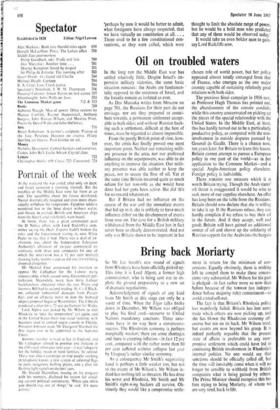Oil on troubled waters
In the long run the Middle East war has settled relatively little. Despite Israel's im- pressive military victories, the same basic situation remains : the Arabs are fundamen- tally opposed to the existence of Israel, and the Israelis remain as isolated as ever.
As Dev Murarka writes from Moscow on page 701, the Russians for their part do not envisage, nor are they prepared to contri- bute towards. a permanent settlement accept- able to both sides; and without Russian back- ing such a settlement, difficult at the best of times, must be regarded as almost impossible.
From the purely British point of view, how- ever, the crisis has finally proved one most important point. Neither our remaining milit- ary presence in the area, nor our professed influence on the superpowers, was able to do anything to improve the situation. Our milit- ary presence was able neither to keep the peace, not to secure the flow of oil. Yet at the same time Britain incurred quite as much odium for her non-role as she would have done had her guns been active. She did this for no reward whatsoever.
But if Britain had no influence on the course of the war and the immediate events that led hp to it, she is unlikely to have much influence either on the development of events from now on: The case for a British military withdrawal from the Middle East has in fact never been so clearly demonstrated. And not only was Britain shown to be impotent in her chosen role of world power, but her policy appeared almost totally estranged from that of France, who emerges as the one major country capable of sustaining relatively good relations with both sides.
The previous Sinai campaign in 1956 saw, as Professor Hugh Thomas has pointed out, the abandonment of the entente cordiale, while this country concentrated on picking up the pieces of the special relationship with the United States. In the Middle East, at least, this has hardly turned out to be a particularly productive policy, as compared with the non- involvement in outside disputes pursued by General de Gaulle. There is a chance how, ten years later, for Britain to learn this lesson. Britain cannot attempt to pursue a European policy in one part of the world—as in Iler application to the Common Market—and a special Anglo-American policy elsewhere. Foreign policy is indivisible.
There remains one measure which it is worth Britain trying. Though the Arab states' oil threat is exaggerated it would be wise to seek more of our supplies elsewhere. An offer has long been on the table from the Russians. Britain should now declare that she is willing to take it up. If the Russians refuse, they can hardly complain if we refuse to buy their oil in the future. And if they accept, well and good; Britain will have gained an additional source of oil And shown up the solidarity of Russian support for the Arabs into the bargain


































 Previous page
Previous page